Home > Cricket > Report
Lessons from Dhaka
Faisal Shariff |
April 24, 2003 20:24 IST
Within a month of the World Cup final in South Africa, the Indian team traveled to Bangladesh for the limited-overs triangular tournament invol-ving hosts Bangladesh and South Africa. The final was an anticlimax as thundershowers washed out any possibility of play forcing finalists India and South Africa to share the TVS Cup.
So, what did India learn from the Dhaka event? What are the lessons the team brings back?
Did India's participation in the TVS Cup make a case for the Board of Control for Cricket in India to rethink its international calendar --- especially considering that there was no prize money for the winner and the runner-up?
The Bangladesh cricket board had a contract with a company for providing the prize money but ESPN-STAR Sports, who were the tournament sponsors and held the rights to the advertising boards, had purchased those rights also at a cost of $15,000 two years ago.
Was this tournament then the cricket equivalent of the Davis Cup?
After a long and weary season that culminated with the six-week long World Cup in South Africa, did it make any sense at all for India to travel to Dhaka for the tournament?
Zaheer Khan, who along with Javagal Srinath and Ashish Nehra bowled India into the World Cup final, pulled up with a hamstring strain. Skipper Sourav Ganguly and Yuvraj Singh skipped a few league games in the tournament owing to injuries.
Despite an injury to the webbing in Harbhajan Singh's bowling hand he bowled through the tournament, thus dashing his hopes of playing for English county Lanca-shire later this year.
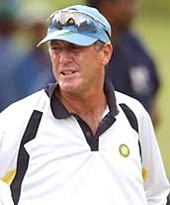 India finally decided to take an assistant coach instead of an assistant manager. A qualified coach and a former Test player like Ashok Malhotra working with John Wright could help the team a lot.
India finally decided to take an assistant coach instead of an assistant manager. A qualified coach and a former Test player like Ashok Malhotra working with John Wright could help the team a lot.
During the World Cup in South Africa India carried a manager and an assistant manager when it would have made more sense to have an assistant coach to help Wright with the training sessions and net practice.
While the manager facilitates the travel and media plans, the coaches help work on the players and enhance their game. Like they say, it is always refreshing to hear a new voice.
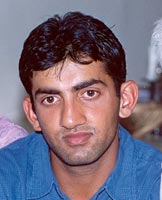 Delhi's Gautam Gambhir made his international debut in the absence of stalwarts Sachin Tendulkar and Rahul Dravid and won himself a man of the match award for his maiden half-century. Though he is an attacking batsman and strong off the back foot -- a necessary qualification to succeed on overseas tours -- a crowded middle-order and a successful opening pair of Tendulkar and Virender Sehwag means the only available piece of real estate for the left-hander is in the dressing room.
Delhi's Gautam Gambhir made his international debut in the absence of stalwarts Sachin Tendulkar and Rahul Dravid and won himself a man of the match award for his maiden half-century. Though he is an attacking batsman and strong off the back foot -- a necessary qualification to succeed on overseas tours -- a crowded middle-order and a successful opening pair of Tendulkar and Virender Sehwag means the only available piece of real estate for the left-hander is in the dressing room.
Former cricketers are of the opinion that Gambhir has the temperament to make it as a competent Test opener -- the only position up for grabs keeping the Australian tour later this year in mind.
John Wright handpicked Mumbai's pace bowler Aavishkar Salvi as an outstanding prospect and recommended that the rich crop of fast bowlers augur well for the Indian team. With an action that is a photocopy of Australian great Glenn McGrath, Salvi has potential and pace in equal measure to add muscle to the Indian attack.
With leg-spinner Anil Kumble slowly fading away after a decade of winning matches for India, there was a huge chasm in the team. Enter Haryana's Amit Mishra, a 21-year-old leg-spinner with prodigious turn and India might have just found itself another long-serving performer. Touring the West Indies with the second string Indian team early this year, Mishra claimed the most wickets and also impressed in the few chances that came his way in the Dhaka triangular.
Parthiv Patel disappointed with the bat but excelled behind the wickets in the absence of makeshift 'keeper Dravid. His keeping to the spinners was flawless. Lithe and quick to react, Parthiv has the necessary ingredients to serve India competently in both versions of the game.
It is now time for India to consider a matrix of six batsmen, one 'keeper and four bowlers instead of the seven-batsmen formula.
With Srinath and Nehra skipping the tourney, Ajit Agarkar played all the games and gave a disciplined bowling performance. Swinging the ball, Agarkar gave glimpses of the bowler he can be when he became the fastest to snap up 50 one-day wickets.
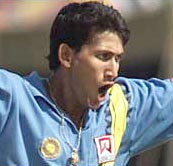 Though he should still take his batting seriously, it is important to let him know that he is in the side as a specialist bowler instead of the hollow all-rounder cap that fails to fit his head. With Srinath nearing his use-by date, Agarkar could be the first change bowler to Zaheer and Nehra. Ditto Sanjay Bangar, whose bits and pieces contributions fail to fill the all-rounder's position in the Indian one-day jigsaw.
Though he should still take his batting seriously, it is important to let him know that he is in the side as a specialist bowler instead of the hollow all-rounder cap that fails to fit his head. With Srinath nearing his use-by date, Agarkar could be the first change bowler to Zaheer and Nehra. Ditto Sanjay Bangar, whose bits and pieces contributions fail to fill the all-rounder's position in the Indian one-day jigsaw.
India essentially has one genuine all-rounder -- Ganguly. As the second most successful opener in one-dayers after Tendulkar, Ganguly is also a seam bowler who can make good use of conditions and chip in with wickets. Sarandeep Singh is at best an accurate and economical off-spinner and a reliable tail-ender but with the more talented Harbhajan having tiled his place in the side, Sarandeep will just have to wait and push his fellow offie out of his comfort zone. Either way it works well for Indian cricket.
  Mohammad Kaif and Yuvraj Singh Mohammad Kaif and Yuvraj Singh |

|
|
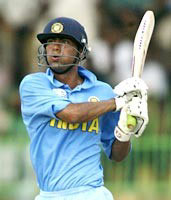 Will Kaif continue to bat number four when Dravid returns? As a batsman whose games revolves around the single, it might not be such a bad idea to retain him at four and have Dravid and Yuvraj bat at five and six. Yuvraj finished the all-important encounter game against Pakistan in the World Cup and provided an encore against Kenya in the league game when India lost three wickets for next to nothing. The new Indian batting line-up could read Tendulkar, Sehwag, Ganguly, Kaif, Dravid and Yuvraj.
Will Kaif continue to bat number four when Dravid returns? As a batsman whose games revolves around the single, it might not be such a bad idea to retain him at four and have Dravid and Yuvraj bat at five and six. Yuvraj finished the all-important encounter game against Pakistan in the World Cup and provided an encore against Kenya in the league game when India lost three wickets for next to nothing. The new Indian batting line-up could read Tendulkar, Sehwag, Ganguly, Kaif, Dravid and Yuvraj.
  Virender Sehwag, deputy captain Virender Sehwag, deputy captain |

|
|
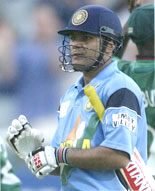 Sehwag stood in as captain for Ganguly in Dhaka and won the game against Bangladesh with relative ease. But is he a good captain?
Sehwag stood in as captain for Ganguly in Dhaka and won the game against Bangladesh with relative ease. But is he a good captain?
One game is too unfair to judge him but from what one saw, Sehwag is an invisible captain unable to read the field settings that would get him wickets. He seemed too defensive at times, probably nervous not to lose his first game as skipper.
The selectors should tip either Yuvraj or Kaif as a potential captain three-four years down the line and groom him under Ganguly, Dravid and Tendulkar. Easing into the leadership job and being earmarked for it make a player more conscious and keen.